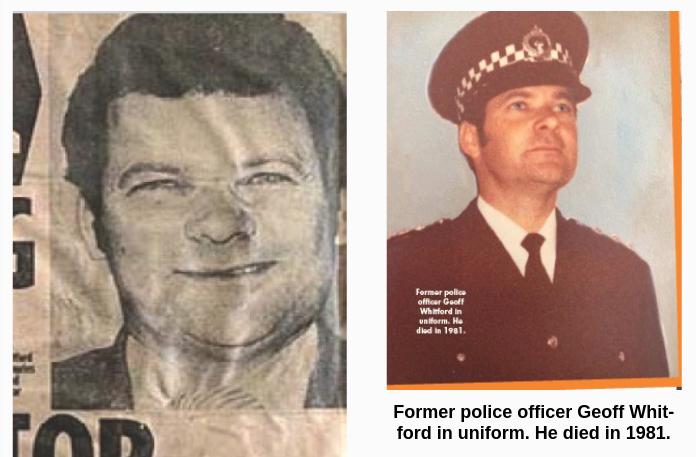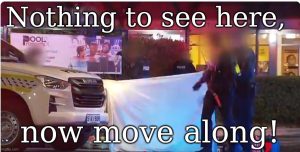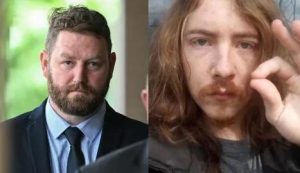Was Honest Cop Geoff Whitford Murdered by SAPOL? Sure Looks Like it.

A high-ranking detective found dead on an isolated beach. According to police, it’s a suicide … but is it? Channel 9’s Under Investigation reopens the case of “the cop who knew too much.”
—
October 1981 and a single gunshot shatters the quiet of a remote rocky cove south of Adelaide. Lying dead is celebrated Detective Inspector Geoff Whitford.
Whitford is the boss of an ultra covert police taskforce charged with investigating and smashing organised crime. Almost immediately, police label the shooting a suicide.
Under Investigation, working with Whitford’s daughter Amanda Schultz, has raised serious questions about the shooting, the police investigation and a coronial report kept secret for 30 years.
Whitford was young at 38 to be leading J1 — a secretive South Australian Police taskforce. He had only been in the job for about 18 months when he died.
Schultz was nine years old at the time. Wanting to find out more about her father, “Whit” as he was affectionately known, Schultz began interviewing his colleagues and friends in 2018.
She soon discovered some strange anomalies in the story about his death.
Whitford Declared Missing – After Just Ten Minutes
On October 22, 1981, the day he died, Whitford was due to give evidence in court against a fellow police officer facing drugs charges. Oddly, he didn’t show up.
Within just 10 minutes of his failure to appear, police launched a state-wide manhunt, setting up a base of operations in Victor Harbour, an hour’s drive south of Adelaide.
In another strange move, senior members of Whit’s own taskforce were ordered not to take part in the search.
Leading Sydney barrister Geoffrey Watson SC told Under Investigation, “It’s a missing police officer. You think you’d throw resources at it. It’s wrong.”
Eighteen hours later, Whitford’s body is discovered
Police say that they were tipped off that Whitford had been seen at Myponga en route to the isolated Myponga Beach.
Whitford’s car was found late that night, and his body was discovered lying between rocks 500 metres away. Access to the area is by a narrow, treacherous “goat track”.
The apparent cause of death: suicide by gunshot.
Forensics experts were called in and conducted their investigation by torch light, with the whole scene cleaned and Whitford’s body removed before first light.
Under Investigation’s panel of experts, including Perth criminal barrister Judith Fordham, question the hasty way this was conducted.
“You could well miss tire tracks, you could well miss footprints, you would certainly miss abrasions, bruises, that sort of thing. The first police on the scene had to borrow a torch from a local, and the only discussion of light is torchlight,” Fordham said.
Police investigation arouses suspicious from Whitford’s family
Schultz and her uncle Ron Whitford, a former CIB detective from Adelaide, conducted their own investigation from 2018.
They discovered police had compiled a report for the coroner recommending suicide. Based on that report, Coroner Kevin Ahern did not order an inquest.
The file was marked “strictly confidential” and kept secret until Ahern’s successor allowed Schultz and her uncle to review the file in 2021. What they discovered shocked them.
They told Under Investigation that it appeared to them that witness statements had been falsified or doctored.
Some witnesses told Under Investigation they had never been formally interviewed by police so had not lodged a statement.
Crime scene evidence had been altered. Two sets of photographs seemed to indicate Whit’s body had been moved.
There was no clear chain of evidence, no running sheet, and no indication of the whereabouts of Whit’s powerful service revolver.
Former South Australian detective Glen Lawrie is suspicious.
“Everything that you take from the crime scene should be documented somewhere,” he said.
Incredibly, the police report states no gunshot residue was found on Whitford’s hands.
“If there’s no gunshot residue, he didn’t pull the trigger. Simple. Somebody else did,” Ron Whitford told Under Investigation.
Informant shared staggering detail before the detective died
Russell Clark is a former heroin dealer and one of Whitford’s informants.
Just days before Whit’s shooting, Clark called him to the Adelaide watch house where he was being held on drug’s charges.
What Clark told Whitford that day shocked the detective inspector to his core.
Clark alleged at least one police officer in Whit’s sphere was a heroin dealer.
Whitford immediately took the new information to superiors working on the secret Griffin Inquiry into police corruption.
Days later Whitford was dead.
Was a notoriously corrupt cop involved in Whitford’s death?
Clark made a second bombshell revelation to Under Investigation.
He says that during a meeting to pick up drugs from a crooked police contact, he was introduced to two detectives from Sydney.
He later identifies one of them as Roger Rogerson, Australia’s most infamous bent cop.
Rogerson’s involvement with a member of Whitford’s team raises suspicion about his death.
“Well, we know he’s a murderer. We know he’s capable of murdering people,” barrister Geoffrey Watson SC says of Rogerson.
Forty years on, panelists call for an independent inquiry
Under Investigation’s examination of the so-called suicide has raised serious questions about the police operation and the role of a potentially corrupt officer in the death.
The evidence indicates Whitford was killed by crooked officers and his murder actively covered up by SAPOL.
Schultz is now campaigning for an independent investigation into the shooting, to examine the discrepancies in this case — even if its final conclusion is suicide.
“I’ve lived my whole life believing that he didn’t want to be here and that we weren’t good enough. And now, all of a sudden, it can be a completely different story,” she said.
“And we deserve to know the truth. That’s just natural, fair justice.”
The Under Investigation episode “The Cop Who Knew Too Much” can be viewed at this link.


